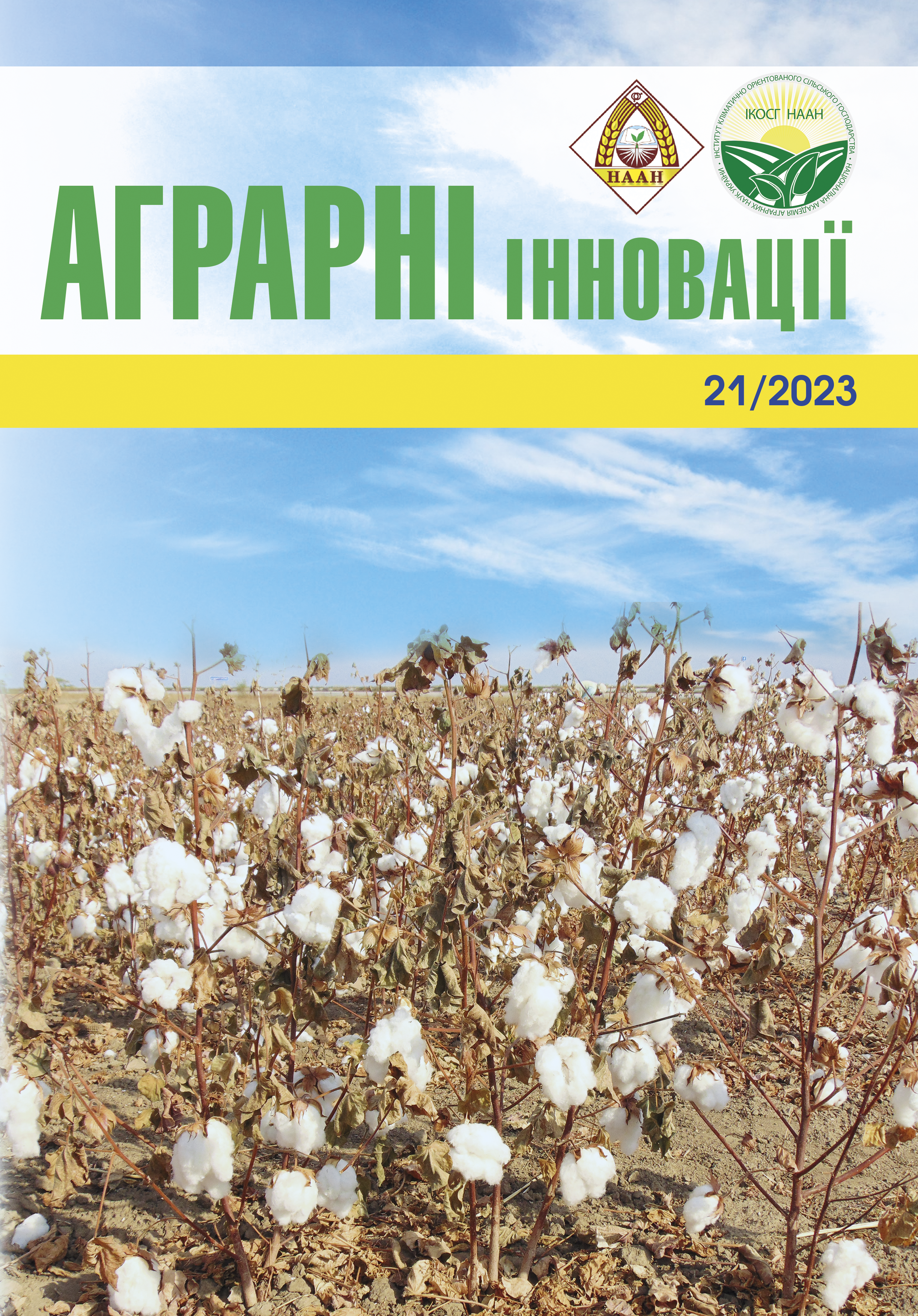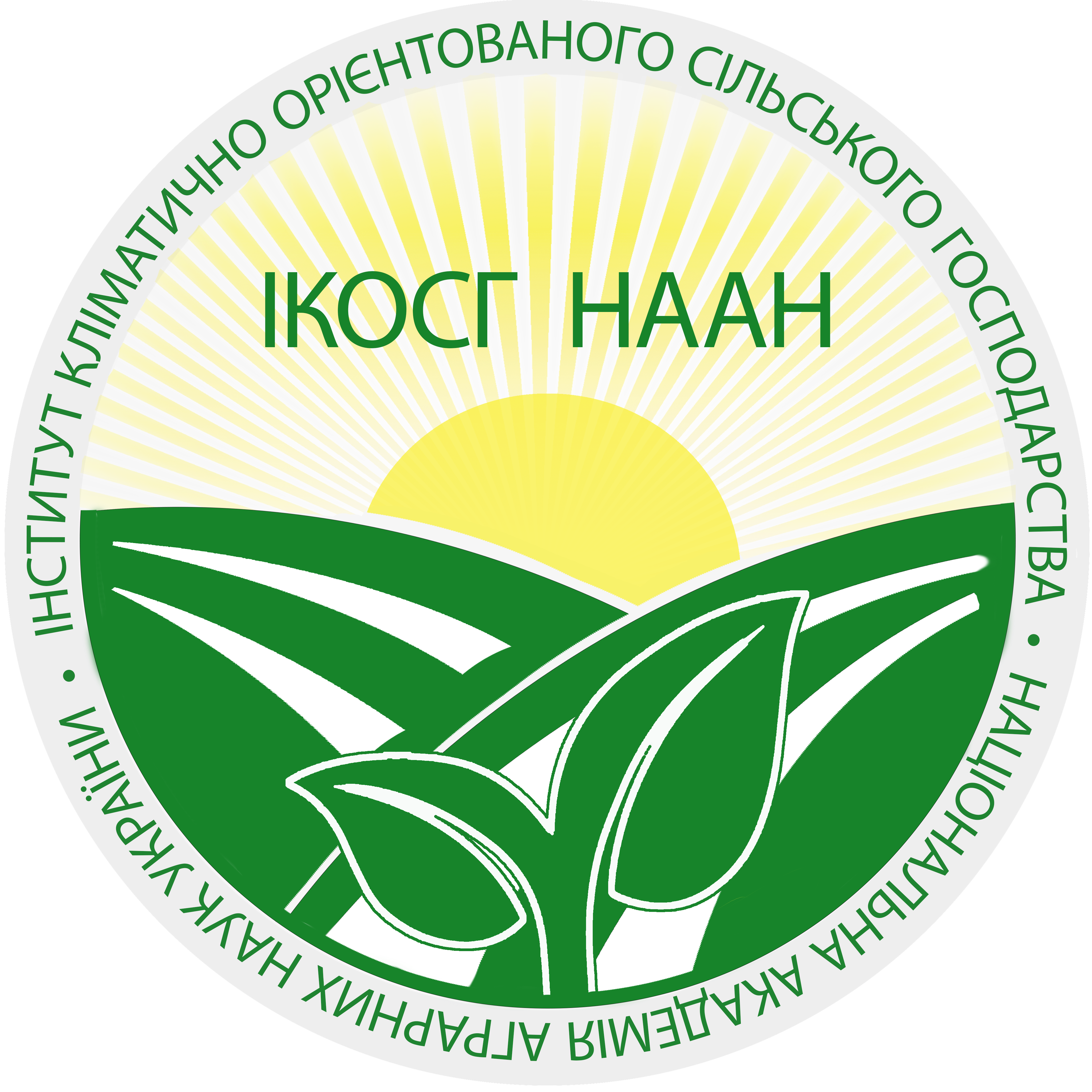Екологічна пластичність та стабільність сортів пшениці озимої в умовахПівденного Степу України (Ч. 2 ‒ посушливі роки)
Анотація
Метою наших досліджень було вивчення і аналіз екологічної стійкості та адаптивності до різних середовищ сортів озимої пшениці селекції Інституту кліматично орієнтованого сільського господарства НААН та Селекційно-генетичного інституту Національного центру насіннєзнавства та сортовивчення НААН в умовах Південного Степу України. Матеріали і методи досліджень. Реакцію 18 сортів озимої пшениці на різні умови вирощування вивчали на Асканійській державній сільськогосподарській дослідницькій станції у с. Тавричанка, Херсонська область (46°33’12»N; 33°49’13»E; 39 м над рівнем моря) протягом 2015/16–2019/20 рр. Дослідження проводилися за різних умов зволоження: при зрошенні та без зрошення. Аналіз екологічної стійкості та адаптивності до різних середовищ сортів озимої пшениці проводили за допомогою різних параметрів. Результати дослідження та їх обговорення. Отримані експериментальні дані дозволяють виділити сорти озимої пшениці за максимальною продуктивністю (Ymax) Марія – 8,61 т/га, Гарантія одеська ‒ 8,23 і Нива одеська – 8,04 т/га, за мінімальною продуктивністю (Ymin) сорти Конка – 4,75 т/га, Кохана – 4,61, Кошова та Зиск – 4,67, Ліра одеська – 4,99 та Щедрість одеська – 4,65 т/га. Найнижчу урожайність за мінімальною продуктивністю сформували сорти Гарантія одеська ‒ 3,01 т/га та Росинка ‒ 3,87 т/га, а сорт Росинка характеризувався ще найнижчою урожайністю за максимальною продуктивністю 5,69 т/га. За параметрами адаптивності, як найбільш стабільні, виділені сорти Кохана, Кошова, Росинка, Зиск та Ліра одеська, натомість Гарантія одеська був виділений як сорт інтенсивного типу. Сорти Асканійська, Пилипівка та Щедрість одеська можуть бути віднесені до пластичних. Сформовано три кластера: в перший кластер об’єдналися одинадцять сортів які більш направлені до пластичного типу, в другий кластер об’єдналися шість сортів які більш направлені до стабільного типу. Сорт Гарантія одеська, утворив кластер 2 ‒ до інтенсивного типу. За кореляційним аналізом виділені параметри адаптивності рівень стійкості до стресових умов (RS), коефіцієнт регресії (bi), дисперсія відхилення від лінії регресії (s2 di), ознака стабільності реакції генотипу (σ2 САЗi), коефіцієнт компенсації (Kgi), відносна стабільність генотипу (sgi), селекційна цінність генотипу (СЦГi), селекційна цінність сорту (Sc) за якими найбільш чітко можна охарактеризувати тип сорту. Висновки. Виділені параметри адаптивності, за ними та біплот-аналізом, як найбільш стабільний, були виділені сорти Кохана, Кошова, Зиск та Ліра одеська, натомість Гарантія одеська та Марія виділені як сорти інтенсивного типу. Сорти Щедрість одеська та Асканійська виділені як пластичні.
Посилання
2. Carlson R. Estimating the biotech sector’s contribution to the US economy. Nat Biotechnol. 2016, Vol. 34, P. 247–255. https://doi.org/10.1038/nbt.3491
3. Eberhart S.A, Rаssell W.A. Stability parameters for comparing varieties. Crop Sc. 1966. Vol. 6. № 1. P. 36–40.
4. Franco F.A., Marchioro V.S., Montecelli T.D.N., Schuster I., Polo M., Souza L.V., Lima F.J.A., Evangelista A., Santos D.A., Grave E.L. CD 1303 – Short stature, high productive potential and industrial quality. Crop Breeding and Applied Biotechnology. 2018, Vol. 18, P. 123–125. https://doi.org/10.1590/1984-70332018v18n1c15
5. Galetto S.L., Bini A.R., Haliski A., Scharr D.A., Borszowskei P.R., Caires E.F. Nitrogen fertilization in top dressing for wheat crop in succession to soybean under a no-till system. Bragantia. 2017, Vol. 76, P. 282–291. https://doi.org/10.1590/1678-4499.095
6. Lavrynenko Yu.O. Breeding heritage and its role in stabilizing production of corn grain in Ukraine. Natural sciences and modern technological solutions: knowledge integration in the XXI century: collective monograph. Lviv-Torun: Liha-Pres, 2019. P. 103–119. https://doi.org/10.36059/978-966-397-154-4/103-119
7. Ojha A. & Ojha B.R. Assessment of Morpho-Physiological, Yield and Yield Attributing Traits Related to Post Anthesis Drought in Wheat Genotypes Under Rainfed Condition in Rampur, Chitwan. Int. J. Appl. Sci. Biotechnol. 2020, Vol. 8, Issue 3, P. 323–335. DOI: 10.3126/ijasbt.v8i3.31609
8. Popov S.I., Leonov O.Yu., Popova K.M., & Avramenko S.V. Ecological plasticity of winter wheat varieties depending on root nitrogen nutrition in the eastern Forest-Steppe of Ukraine. Plant Varieties Studying and Protection. 2019. Vol. 15, Issue 3. P. 296–302. doi: 10.21498/2518-1017.15.3.2019.181087
9. Ray D.K., Mueller N.D., West P.C., Foley J.A. Yield trends are insufficient to double global crop production by 2050. PLoS ONE. 2013, Vol. 8, E66428. https://doi.org/10.1371/journal.pone.0066428
10. Rosielle A.A., Hamblin J. Theoretical aspects of selection for yield in stress and non-stress environments. Crop Science. 1981. Vol. 21, № 6. Р. 943–946. doi:10.2135/cropsci1981.0011183X002100060033x
11. Subira J., Álvaro F., del Moral L.F.G., & Royo C. Breeding effects on the cultivar × environment interaction of durum wheat yield. European Journal of Agronomy, 2015, Vol. 68, 78–88. https://doi.org/10.1016/j.eja.2015.04.009
12. Tyshchenko A.V., Tyshchenko O.D., Konovalova V.M., Fundirat K.S., Piliarska O.O. Methods of determining the adaptability and ecological stability of plants. Scientific Collection «InterConf+», 33(155): with the Proceedings of the 1st International Scientific and Practical Conference «Modern Knowledge: Research and Discoveries» (May 19–20, 2023; Vancouver, Canada) by the SPC «InterConf». A.T. International, 2023. P. 324–342. https://doi.org/10.51582/interconf.19-20.05.2023.029 ISSN 2709-4685
13. Tyshchenko O., Tyshchenko A., Piliarska O., Kuts H., Lykhovyd P. Evaluation of drought tolerance in alfalfa (Medicago sativa) genotypes in the conditions of osmotic stress. AgroLife Scientific Journal. 2020. Vol. 9, No. 2, P. 353–358. ISSN 2285-5718
14. Vozhehova R., Tyshchenko A., Tyshchenko O., Dymov O., Piliarska O., Lykhovyd P. Evaluation of breeding indices for drought tolerance in alfalfa (Medicago) genotypes. Scientific Papers. Series A. Agronomy. 2021. Vol. LXIV, No. 2. Р. 435–444.
15. Yadav R., Gupta S., Gaikwad K.B., Bainsla N.K., Kumar M., Babu P., Ansari R., Dhar N., Dharmateja P. & Prasad R. Genetic Gain in Yield and Associated Changes in Agronomic Traits in Wheat Cultivars Developed Between 1900 and 2016 for Irrigated Ecosystems of Northwestern Plain Zone of India. Front. Plant Sci. 2021, Vol. 12:719394. doi: 10.3389/fpls.2021.719394
16. Вожегова Р.А., Тищенко А.В., Тищенко О.Д., Димов О.М., Люта Ю.О. Особливості прояву адаптивних ознак у селекційних популяцій люцерни при вирощуванні на насіння. Вісник СумНАУ. Серія «Агрономія і біологія». 2021. Випуск 2(44), С. 3–11. https://doi.org/10.32845/agrobio.2021.2.1
17. Вожегова Р.А., Тищенко А.В., Тищенко О.Д., Димов О.М., Пілярська О.О. Оцінювання посухостійкості селекційного матеріалу люцерни за показниками водного режиму в умовах Півдня України. Plant Varieties Studying and protection. 2021, Vol. 17, No 1. С. 21–29. https://doi.org/10.21498/2518-1017.17.1.2021.228204
18. Вожегова Р.А., Тищенко А.В., Тищенко О.Д., Пілярська О.О., Гальченко Н.М. Оцінка посухостійкості популяцій люцерни кормового використання в рік сівби за математичними індексами. Аграрні інновації. 2022. № 13. С. 190–198. https://doi.org/10.32848/agrar.innov.2022.13.28
19. Вожегова Р.А., Тищенко А.В., Тищенко О.Д., Пілярська О.О., Фундират К.С., Коновалова В.М. Особливості прояву адаптивних ознак у популяцій люцерни за кормового використання. Аграрні інновації. 2022. № 14. С. 135–144. https://doi.org/10.32848/agrar.innov.2022.14.20
20. Вожегова Р.А., Тищенко А.В., Тищенко О.Д., Пілярська О.О., Фундират К.С., Гальченко Н.М. Оцінка посухостійкості популяцій люцерни за насіннєвого використання в рік сівби. Аграрні інновації. 2022. № 15. С. 89–96. DOI https://doi.org/10.32848/agrar.innov.2022.15.14
21. Вожегова Р.А., Тищенко А.В., Тищенко О.Д., Пілярська О.О., Фундират К.С., Коновалова В.М. Визначення посухостійкості популяцій люцерни насіннєвого використання за математичними індексами. Вісник аграрної науки. 2023. № 1 (838). С. 40–48. https://doi.org/10.31073/agrovisnyk202301-05
22. Вожегова Р.А., Тищенко А.В., Тищенко О.Д., Пілярська О.О., Фундират К.С., Коновалова В.М. Насіннєва продуктивність популяцій люцерни другого року життя та особливості прояву у них адаптивних ознак. Аграрні інновації. 2022. № 16. С. 94–103. https://doi.org/10.32848/agrar.innov.2022.16.15
23. Вожегова Р.А., Тищенко А.В., Тищенко О.Д., Пілярська О.О., Фундират К.С., Коновалова В.М. Формування стійкості рослин насіннєвої люцерни в умовах різного екологічного градієнта. Вісник аграрної науки. 2023. № 3 (840). С. 53–62. https://doi.org/10.31073/agrovisnyk202303-08
24. Вожегова Р.А., Тищенко А.В., Тищенко О.Д., Пілярська О.О., Фундират К.С., Коновалова В.М. Посухостійкість популяцій люцерни другого року за кормового використання. Аграрні інновації. 2023. № 17. С. 25–36. https://doi.org/10.32848/agrar.innov.2023.17.4
25. Лавриненко Ю.О., Вожегова Р.А., Базалій Г.Г., Усик Л.О., Жупина А.Ю. Вплив зрошення на продуктивність різних сортотипів озимої пшениці в умовах Південного Степу України. Наукові доповіді НУБіП України. 2019. № 3 (79). http://dx.doi.org/10.31548/dopovidi2019.03.014
26. Тищенко А.В., Тищенко О.Д., Люта Ю.О. Оцінка генотипів люцерни за насіннєвою продуктивністю на посухостійкість. Таврійський науковий вісник. Херсон: ВД «Гельветика», 2021. № 120. С. 155–168. https://doi.org/10.32851/2226-0099.2021.120.21
27. Тищенко А.В., Тищенко О.Д., Люта Ю.О., Пілярська О.О. Адаптивна здатність – важлива ознака в селекції рослин. Зрошуване землеробство. 2021. № 75, С. 101–109. https://doi.org/10.32848/0135-2369.2021.75.19






